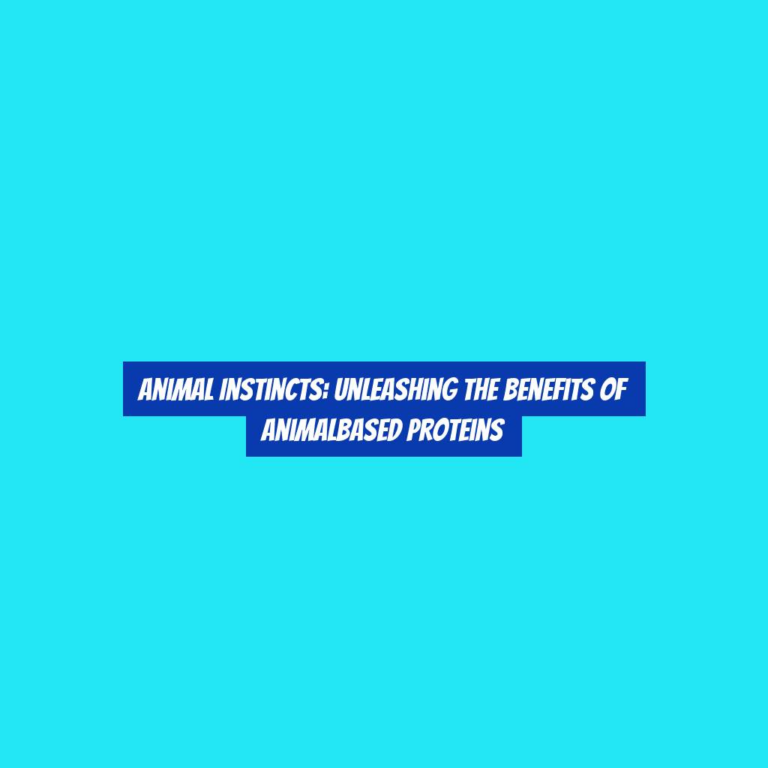From Farm to Fork: Exploring AnimalBased Proteins and Their Role in Nutrition
As you sit down to savor your next meal, have you ever considered the journey that animal-based proteins take from the farm to your fork?
The world of nutrition is constantly evolving, and the role of animal-based proteins in our diets is a topic of much debate and exploration. Understanding the impact of these proteins on our health, the environment, and ethical considerations is crucial in making informed dietary choices.
So, letG??s unravel the complexities and implications of animal-based proteins and their role in nutrition, shedding light on the various factors that influence our food choices and overall well-being.
Nutritional Profile of Animal-Based Proteins
When choosing animal-based proteins, consider their nutritional profile to ensure you meet your dietary needs efficiently. Animal-based proteins provide essential nutrients such as complete proteins, iron, zinc, and B vitamins.
A 3-ounce serving of lean beef, for example, contains about 25 grams of high-quality protein, along with essential nutrients like zinc, iron, and B vitamins, which are vital for energy metabolism.
Poultry, such as chicken and turkey, also offers high-quality protein and essential nutrients, including niacin, selenium, and phosphorus.
Additionally, eggs are a complete protein source, providing all the essential amino acids your body needs.
Fish, such as salmon and tuna, are rich in omega-3 fatty acids, which are beneficial for heart health.
Dairy products like milk, yogurt, and cheese are excellent sources of protein and provide essential nutrients, including calcium, vitamin D, and potassium.
When incorporating animal-based proteins into your diet, choose a variety of sources to ensure you get a wide range of essential nutrients.
Environmental Impact of Animal Agriculture
Consider the environmental impact of animal agriculture, as it plays a significant role in the overall sustainability of animal-based protein production.
The environmental impact of animal agriculture encompasses various aspects, including land use, water usage, greenhouse gas emissions, and waste management.
Large-scale animal farming requires substantial land for grazing and growing feed crops, leading to deforestation and habitat loss. Additionally, the water footprint of animal agriculture is substantial, with the need for water in livestock drinking, feed production, and processing. This can strain local water resources and contribute to water pollution through runoff of animal waste and chemicals.
Moreover, animal agriculture is a significant contributor to greenhouse gas emissions, particularly methane and nitrous oxide from livestock digestion and manure management. These emissions contribute to climate change and environmental degradation. Effective waste management in animal agriculture is also crucial to minimize pollution of soil and water bodies.
Considering the environmental impact of animal agriculture is essential in making informed decisions about sustainable protein production and consumption. As consumers, itG??s important to be aware of these aspects and support practices that prioritize environmental sustainability in animal-based protein production.
Ethical Considerations in Animal Protein Consumption
Have you ever pondered the ethical implications of consuming animal-based proteins in your diet? As you consider the source of your food, itG??s important to reflect on the ethical considerations surrounding animal protein consumption. Here are some key points to consider:
-
Impact on Animal Welfare: The conditions in which animals are raised and slaughtered for food can raise ethical concerns. Many people question whether the treatment of animals in industrial farming aligns with their personal values.
-
Supporting Ethical Practices: Some individuals choose to consume animal-based proteins from sources that prioritize ethical treatment of animals. This may involve seeking out products that are certified as humanely raised or produced through sustainable and ethical farming practices.
ItG??s crucial to be mindful of the ethical dimensions of animal protein consumption, as this awareness can influence personal dietary choices and contribute to a broader conversation about food ethics and sustainability.
Role of Animal Proteins in a Balanced Diet
Animal proteins play a vital role in a balanced diet, providing essential nutrients and supporting overall health and well-being. TheyG??re rich in high-quality protein, containing all the essential amino acids that your body needs for various functions.
Additionally, animal proteins are excellent sources of essential nutrients such as iron, zinc, vitamin B12, and omega-3 fatty acids, which are crucial for maintaining optimal health. These nutrients play key roles in supporting your immune system, promoting muscle growth and repair, and aiding in the proper functioning of your brain and nervous system.
Incorporating animal proteins into your diet can help you feel full and satisfied for longer periods, which can be beneficial for weight management and preventing overeating. Furthermore, the bioavailability of nutrients in animal proteins is generally higher compared to plant-based sources, meaning that your body can more readily absorb and utilize these essential nutrients.
However, itG??s important to consume animal proteins in moderation and choose lean, high-quality sources to minimize the intake of unhealthy saturated fats. Balancing your diet with a variety of protein sources, including both animal and plant-based options, can help you meet your nutritional needs while promoting overall health and well-being.
Sustainable Sourcing and Production of Animal-Based Proteins
As you explore the role of animal proteins in a balanced diet, itG??s crucial to consider the sustainable sourcing and production methods that contribute to the overall impact of animal-based proteins on both health and the environment.
Sustainable sourcing of animal-based proteins involves ethical and environmentally friendly practices, ensuring the well-being of animals and the preservation of natural resources. This approach not only supports animal welfare but also reduces the environmental footprint associated with protein production.
-
Implementing humane farming practices
-
Providing adequate living conditions and access to natural behaviors for animals
-
Environmental Conservation
-
Minimizing water usage and pollution from farming operations
-
Utilizing regenerative agricultural practices to preserve soil health and biodiversity
Conclusion
So, next time youG??re at the grocery store or planning your meals, consider the nutritional benefits, environmental impact, and ethical considerations of animal-based proteins. They play a crucial role in a balanced diet and can be sourced and produced sustainably.
By making informed choices, you can support your health, the environment, and ethical treatment of animals. From farm to fork, animal-based proteins have a significant impact on nutrition and our world.

